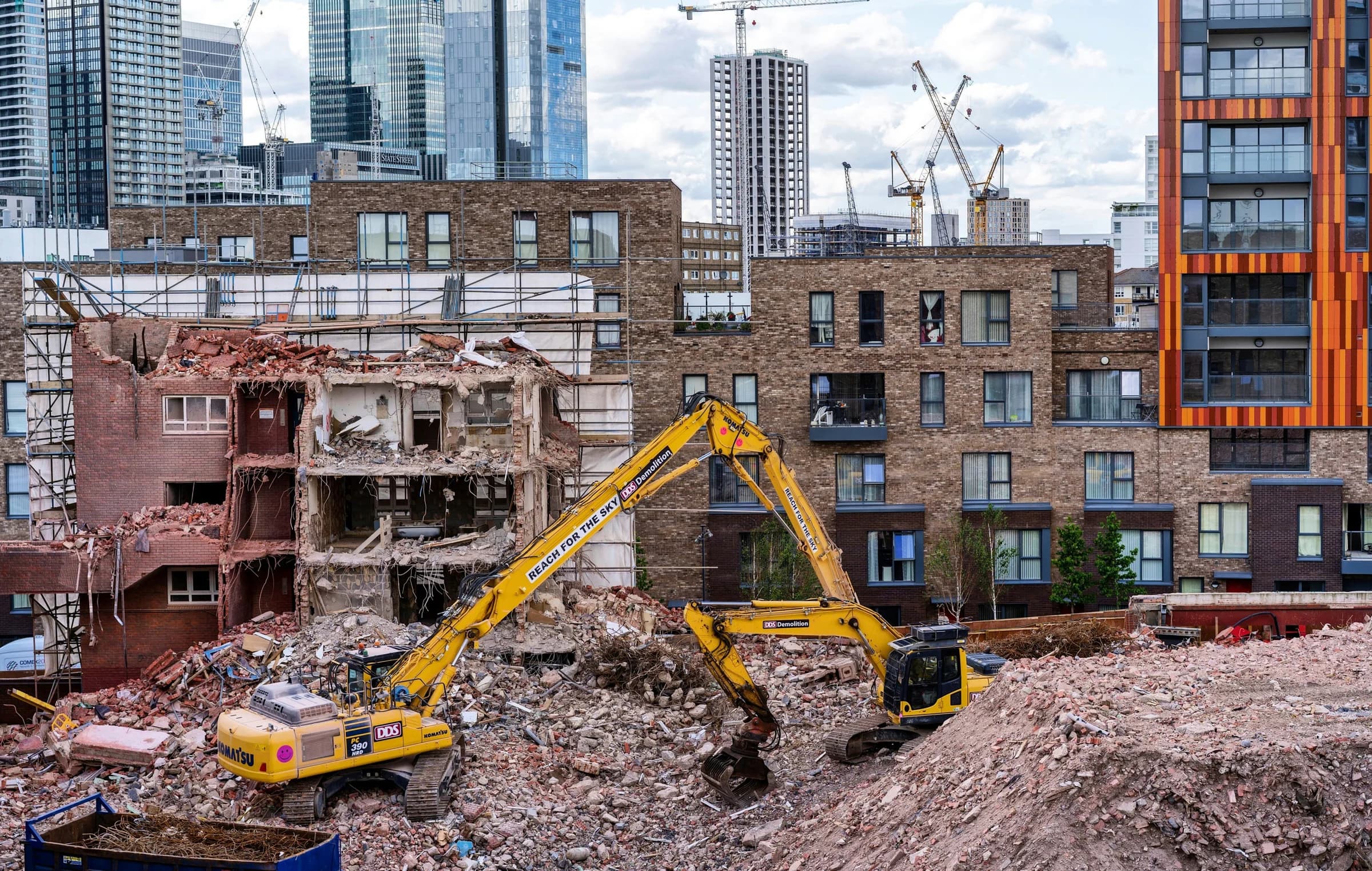AI-Generated Summary
Jede Minute wird in Europa ein Gebäude zerstört. Dies ist die zentrale Botschaft des Artikels von Marius Münstermann, veröffentlicht von CORRECTIV, das sich mit investigativem Journalismus in Europa beschäftigt. Der Artikel beleuchtet die weitreichenden Auswirkungen des Abrisses von Gebäuden auf das Klima, die Natur und die Wohnsituation in Europa, und kritisiert die mangelhafte Datenerhebung zu diesem Thema auf EU-Ebene.
Abriss und Neubau: Ein unsichtbares Problem
Der Abriss von Gebäuden wird in der politischen Debatte weitgehend ignoriert, obwohl er erhebliche Auswirkungen auf die Umwelt hat. Die EU-Kommission hat auf Anfrage von CORRECTIV erklärt, dass es keine offiziellen Daten zur Anzahl der abgerissenen Gebäude gibt. Laut Ciarán Cuffe, Ko-Vorsitzender der Grünen im EU-Parlament, treiben Abriss und Neubau sowohl die Klimakrise als auch die Wohnungskrise voran. Viele Gebäude werden unnötig abgerissen, während sie durch Sanierungen erhalten werden könnten. Es wird gefordert, bessere Daten zur Abrissrate zu sammeln, um den Zustand des europäischen Gebäudebestands besser zu verstehen.
Klimafolgen des Bauens
Der Gebäudesektor ist der größte Energieverbraucher in der EU und verursacht 40 % des gesamten Energieverbrauchs sowie 36 % der Treibhausgasemissionen. Die Deutsche Umwelthilfe schätzt, dass in Deutschland jährlich 3,3 Millionen Tonnen CO2 durch Abriss und Neubau emittiert werden. Sanierungen könnten diese Emissionen um ein Drittel reduzieren. DUH empfiehlt, bestehende Gebäude energetisch zu sanieren, anstatt sie abzureißen, da dies aus ökologischer Sicht sinnvoller ist.
Die Sanierungsquote in Europa
Aktuell hinken die EU-Mitgliedstaaten bei der energetischen Sanierung ihrer Gebäude hinterher. Die jährliche Renovierungsrate beträgt lediglich 1 %, was als sehr niedrig gilt. Um die Klimaziele bis 2050 zu erreichen, müsste diese Quote auf 3 % steigen. Der Industrieverband Efficient Buildings Europe fordert seit 2011 eine drastische Erhöhung der Sanierungsrate und betont die positiven Auswirkungen auf den Arbeitsmarkt. Jede Million Euro, die in die Energieeffizienz investiert wird, schafft 19 lokale Arbeitsplätze im Bauwesen.
Abbruchatlas Europa
Um die Datenlage zu verbessern, hat CORRECTIV das Projekt "Demolition Atlas Europe" ins Leben gerufen. Dieses Projekt zielt darauf ab, Informationen zu abgerissenen Gebäuden und geplanten Abrissen zu sammeln, um Transparenz zu schaffen. In Deutschland wurden 2022 12.600 Gebäude abgerissen, was zu einem Verlust von 16.500 Wohnungen führte. Da viele Abrisse nicht genehmigungspflichtig sind, wird die tatsächliche Zahl der Abrisse wahrscheinlich höher sein als die offiziellen Statistiken vermuten lassen.
Forderungen für eine nachhaltige Baukultur
Die Initiative HouseEurope! hat drei konkrete Forderungen formuliert, um mehr Renovierungen und weniger Abrisse zu fördern. Diese beinhalten Steuerermäßigungen für Materialien und Arbeitskosten, eine Umverlagerung von Fördergeldern von Neubauten hin zu Sanierungen, sowie ein Preisschild für die graue Energie, die beim Abriss verloren geht. Der Architekt Olaf Grawert betont die Notwendigkeit, alte Gebäude als potenzielle Wertobjekte zu betrachten und die Finanzierung von Umbauprojekten zu erleichtern.
Der Weg in eine nachhaltige Zukunft
Abschließend wird festgestellt, dass es für Investoren oft profitabler ist, Gebäude abzureißen und neu zu bauen, anstatt sie zu renovieren. Diese Praxis hat weitreichende soziale und ökologische Konsequenzen. HouseEurope! und andere Organisationen fordern von der EU und den Mitgliedstaaten, die gesetzlichen Rahmenbedingungen zu ändern, um eine nachhaltige Baukultur zu fördern und die Sanierungsziele endlich zu erreichen.
